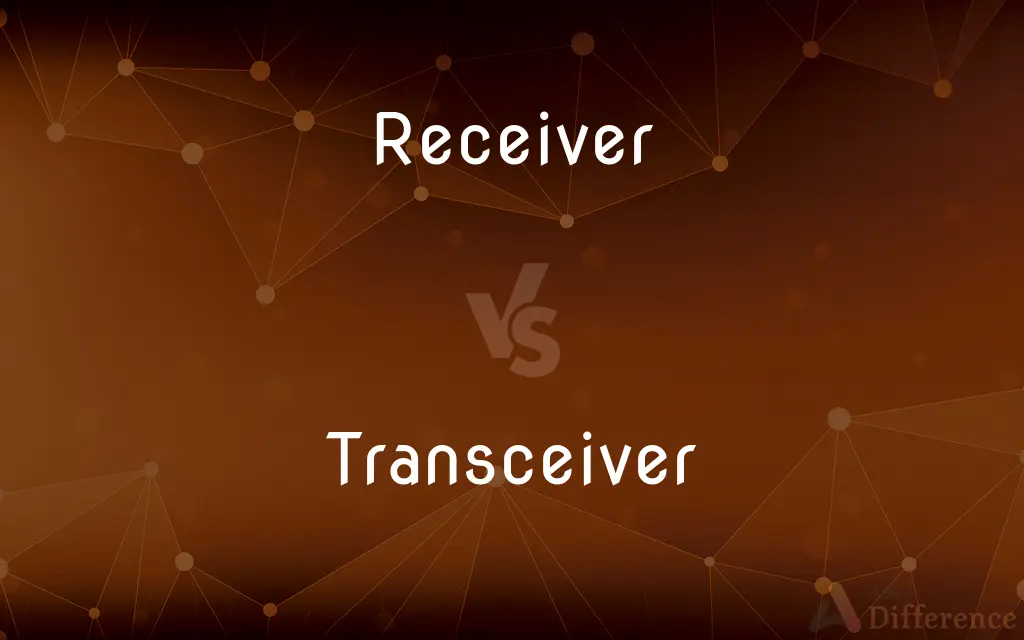Receiver vs. Transceiver — What's the Difference?
By Maham Liaqat & Fiza Rafique — Updated on March 15, 2024
A receiver is designed to receive signals, while a transceiver can both transmit and receive signals.

Difference Between Receiver and Transceiver
Table of Contents
ADVERTISEMENT
Key Differences
A receiver is specifically built to capture radio, television, or other signals. It decodes the information for output (e.g., sound, images). On the other hand, a transceiver combines the functionalities of a transmitter and a receiver into a single device, allowing it to both send and receive information. This dual capability is essential in two-way communication devices like walkie-talkies and cellular phones.
While receivers play a crucial role in one-way communication systems, such as radio and television broadcasting, where information flows from a single source to multiple endpoints, transceivers are indispensable in interactive communication systems. These systems, including most modern communication devices, rely on the ability to both send and receive information for dynamic interaction.
The design complexity of transceivers is typically higher than that of receivers because they must manage the simultaneous or switchable functions of transmitting and receiving. This complexity often leads to a higher cost. Receivers, being dedicated to a single function, can be optimized for sensitivity and selectivity, potentially resulting in a cost advantage and specialized performance in their sole function.
In terms of application, receivers are often found in settings where information is predominantly consumed, such as in homes for television and radio. Transceivers, however, are more common in devices designed for interactive communication, like mobile phones and network routers, highlighting their versatility in various technological environments.
The technological advancements in transceivers have also led to the development of sophisticated systems that can operate in multiple frequency bands and modes, enhancing the flexibility and functionality of communication devices. Meanwhile, receivers continue to evolve in terms of efficiency and effectiveness in signal decoding, emphasizing their importance in the reception of broadcast signals.
ADVERTISEMENT
Comparison Chart
Functionality
Receives signals only
Transmits and receives signals
Communication
One-way (reception only)
Two-way (can both send and receive)
Complexity
Generally simpler
More complex due to dual functionality
Primary Use
Radio, TV broadcasting reception
Interactive communication (phones, radios)
Cost
Often less expensive due to simpler design
Typically more expensive due to added complexity
Compare with Definitions
Receiver
A device that receives radio or television signals.
The radio receiver tuned into the local station perfectly.
Transceiver
A device capable of both transmitting and receiving communications.
The two-way radio transceiver allowed for efficient communication between teams.
Receiver
An apparatus for receiving signals or information.
The satellite receiver processes signals from space.
Transceiver
A portable, two-way radio communication device.
Emergency services used a transceiver to coordinate their response.
Receiver
A component in an audio system that receives and amplifies sound.
The audio receiver connected to the speakers filled the room with music.
Transceiver
An electronic module in networking equipment for bidirectional communication.
The fiber optic transceiver improved the network's speed and reliability.
Receiver
The part of a firearm that houses the operating parts.
The gun's receiver was carefully cleaned and maintained.
Transceiver
An integrated circuit in mobile phones for communication.
The smartphone's transceiver chip manages both incoming and outgoing signals.
Receiver
Part of a telephone that converts electronic signals into audio.
She spoke into the receiver to answer the call.
Transceiver
A component in wireless systems for sending and receiving signals.
The wireless transceiver enabled the remote control to operate the drone.
Receiver
The part of a telephone apparatus contained in the earpiece, in which electrical signals are converted into sounds.
Transceiver
In radio communication, a transceiver is an electronic device which is a combination of a radio transmitter and a receiver, hence the name. It can both transmit and receive radio waves using an antenna, for communication purposes.
Receiver
A person who gets or accepts something that has been sent or given to them
The receiver of a gift
Transceiver
A transmitter and receiver housed together in a single unit and having some circuits in common, often for portable or mobile use.
Receiver
A person or company appointed by a court to manage the financial affairs of a business or person that has gone bankrupt
The company is in the hands of the receivers
Transceiver
A combined radio transmitter and receiver.
Receiver
A container for collecting the products of distillation, chromatography, or other process.
Transceiver
(computing) A device that performs transmitting and receiving functions, especially if using common components.
Receiver
The part of a firearm which houses the action and to which the barrel and other parts are attached.
Receiver
One that receives something:a receiver of many compliments.
Receiver
A device, such as a part of a radio, television set, or telephone, that converts incoming electromagnetic signals into sound, light, or electrical signals.
Receiver
A person appointed by a court to receive and responsibly administer funds or property connected with ongoing litigation.
Receiver
A person who knowingly buys or receives stolen goods.
Receiver
A receptacle intended for a specific purpose.
Receiver
(Football)A member of the offensive team eligible to catch a forward pass.
Receiver
(Sports)A player who receives a pass.
Receiver
(Baseball)The catcher.
Receiver
A person.
Receiver
An official whose job is to receive taxes or other monies; a tax collector, a treasurer.
Receiver
A person who receives something in a general sense; a recipient.
Receiver
A person who accepts stolen goods.
Receiver
A person or company appointed to settle the affairs of an insolvent entity.
Receiver
(American football) An offensive player who catches the ball after it has been passed.
Receiver
(racquet sports) A person who attempts to return the serve.
Receiver
An item or apparatus.
Receiver
Something which receives some substance or object, in a general sense; a receptacle.
Receiver
(chemistry) A vessel for receiving and holding the products of distillation, or for containing gases.
Receiver
An airtight vessel from which air is pumped in order to form a vacuum.
Receiver
(firearms) The part of a firearm containing the action.
Receiver
A vessel for receiving the exhaust steam from the high-pressure cylinder before it enters the low-pressure cylinder, in a compound steam engine.
Receiver
Any of several electronic devices that receive electromagnetic waves, or signals transmitted as such.
Receiver
The part of a telephone handset contained in the earpiece; hence the handset itself; an earpiece.
Receiver
(finance) A swaption which gives its holder the option to enter into a swap in which they pay the floating leg and receive the fixed leg.
Receiver
One who takes or receives in any manner.
Receiver
A person appointed, ordinarily by a court, to receive, and hold in trust, money or other property which is the subject of litigation, pending the suit; a person appointed to take charge of the estate and effects of a corporation, and to do other acts necessary to winding up its affairs, in certain cases.
Receiver
One who takes or buys stolen goods from a thief, knowing them to be stolen.
Receiver
A vessel connected with an alembic, a retort, or the like, for receiving and condensing the product of distillation.
Receiver
The glass vessel in which the vacuum is produced, and the objects of experiment are put, in experiments with an air pump. Cf. Bell jar, and see Illust. of Air pump.
Receiver
A vessel for receiving the exhaust steam from the high-pressure cylinder before it enters the low-pressure cylinder, in a compound engine.
Receiver
That portion of a telephonic apparatus, or similar system, at which the message is received and made audible; - opposed to transmitter.
Receiver
In portable breech-loading firearms, the steel frame screwed to the breech end of the barrel, which receives the bolt or block, gives means of securing for firing, facilitates loading, and holds the ejector, cut-off, etc.
Receiver
Set that receives radio or tv signals
Receiver
(law) a person (usually appointed by a court of law) who liquidates assets or preserves them for the benefit of affected parties
Receiver
Earphone that converts electrical signals into sounds
Receiver
A person who gets something
Receiver
A football player who catches (or is supposed to catch) a forward pass
Common Curiosities
Why are transceivers important in communication?
Transceivers enable two-way communication, which is essential for interactive communication systems like mobile phones and walkie-talkies.
Is a smartphone a receiver or a transceiver?
A smartphone is a transceiver because it can both send and receive information.
Can a receiver transmit signals?
No, a receiver is only designed to receive signals, not transmit them.
What is a receiver?
A receiver is a device designed to receive and process signals, such as those from radio or television broadcasts.
What is the advantage of a receiver in a home entertainment system?
In a home entertainment system, a receiver can amplify and decode audio and video signals for high-quality output.
Can a transceiver work as a receiver only?
Yes, a transceiver can be set to receive-only mode, but its capability to transmit remains.
What makes a transceiver more complex than a receiver?
The need to manage both transmitting and receiving functions, often simultaneously, adds to the complexity and design of transceivers.
Why might someone choose a receiver over a transceiver for a specific application?
For applications that only require signal reception without the need for transmission, a receiver might be chosen for its simplicity and potentially lower cost.
What does a transceiver do?
A transceiver is capable of both transmitting and receiving signals, enabling two-way communication.
Do transceivers cost more than receivers?
Generally, yes, due to their added complexity and dual functionality.
Are all radios transceivers?
Not all radios are transceivers; some are only receivers, designed to listen to broadcasts without the capability to transmit.
How have advancements in technology affected the development of transceivers?
Technological advancements have led to more compact, efficient, and versatile transceivers, expanding their use in various communication devices and systems.
How do transceivers in mobile phones work?
Mobile phone transceivers manage communication by converting voice and data into radio signals for transmission and vice versa.
Can receivers be part of a transceiver system?
Yes, receivers are integral components of transceiver systems, handling the reception part of the communication.
What role do transceivers play in wireless communication?
Transceivers facilitate wireless communication by enabling devices to send and receive signals over distances without physical connections.
Share Your Discovery

Previous Comparison
Grandpa vs. Pops
Next Comparison
Epidote vs. OlivineAuthor Spotlight
Written by
Maham LiaqatCo-written by
Fiza RafiqueFiza Rafique is a skilled content writer at AskDifference.com, where she meticulously refines and enhances written pieces. Drawing from her vast editorial expertise, Fiza ensures clarity, accuracy, and precision in every article. Passionate about language, she continually seeks to elevate the quality of content for readers worldwide.














































